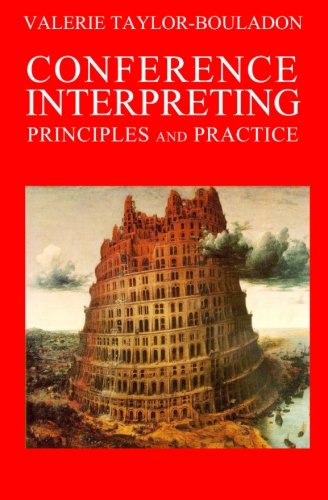
The following text is taken from by Valerie Taylor-Bouladon‘s extremely useful book, Conference Interpreting – Principles and Practice.
Conference Interpreting – Principles and Practice Tayor-Bouladon, Valerie, Crawford House Adelaide. 2001
Keep up your languages
There is a saying I have heard, generally applied to “grey power”(that is, those rather long in the tooth) : “Use it or Lose it!” This saying applies to interpreters’ languages at any age. You must use your languages, read in them, speak in them, listen to them spoken or you will forget them.
Languages evolve all the time. If you left Guatemala or Argentina ten or more years ago, you can be sure the language you speak is not the same as is spoken there today and you will need to make a conscious effort to keep in touch. Quite apart from that, your Spanish will now be contaminated with the language being spoken around you. You may not even realize you are saying “el reporte” instead of “el informe”. English short cuts also have an insidious way of insinuating themselves into other languages. So you must be constantly on the look-out for anglicisms in your speech. It is essential to read newspapers and literature from the countries whose languages you work into and from in order to keep them up to date. It is no good just glancing at the headlines and reading only the subjects of personal interest. Thorough reading is required with an open mind as to type of language used, shades of meaning, paying particular attention to current affairs.
As W. Keiser (1975) explains, beginners must also “acquire total mastery of the jargon typical of international negotiations and meetings i.e. terms and expressions directly related to conference procedure, the organization of meetings, voting, the amendment of texts such as resolutions, the preambular as opposed to the operative sections of resolutions, etc. Useful words: The Chair – to chair – the Chairman – Madame Chairman – The President – To call the meeting to order – to close the meeting – to adjourn the meeting – vote – ballot – casting vote – roll-call – secret ballot – to give the floor – to call on – filibuster – delegate – substitute or deputy – representative – credentials – proxy – delegation of powers – plenipotentiary -Standing orders – agenda – draft agenda – approval of agenda, resolution, statement, declaration, decision – preamble – items on the agenda – to delete an item – agreement – undertaking – provision – entry into force – ratification – signatories, etc.”
In simultaneous interpretation, the interpreter is at the mercy of the speaker and must learn to construct his sentences with flexibility, especially when interpreting from and into languages with different syntax. He must also be prepared to handle heavy, verbose or flowery speech, to change the order in cases where logical progression differs according to different cultures, to cut lengthy sentences into several short ones, and even find vague expressions and padding to overcome temporary difficulties, that is, while you are waiting for the speaker to clarify something incomprehensible he has just said.
“The interpreter is a professional speaker. He must therefore be able to adapt his style to his audience and carry the original message in the way it would have been delivered by the speaker had he addressed the audience in the language into which the interpreter works. ”
If you are a beginner, you can also learn a lot from listening to experienced colleagues working in your languages to see how they tackle a particular difficulty or subject. When you are not actually on the air yourself, switch over to the other booths to hear the words being used – this may be of great help because the delegates speaking those languages will be using the same words. This is also an excellent way to improve your vocabulary in your passive languages.